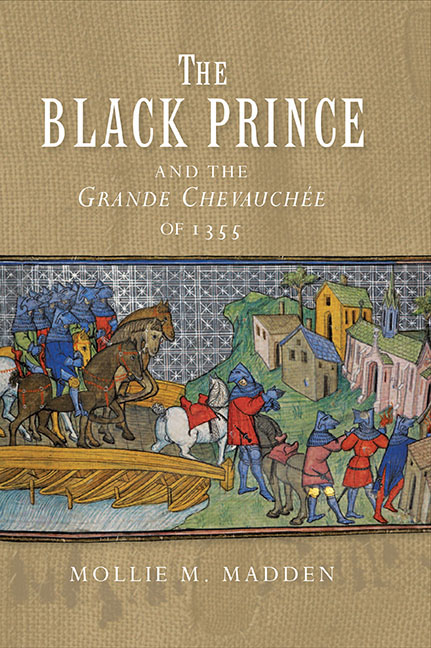Book contents
- Frontmatter
- Dedication
- Contents
- List of Illustrations
- Acknowledgements
- List of Abbreviations
- A Note on Measurements
- Map
- Introduction
- 1 The Preparations for the Chevauchée: England's Existing System of Purveyance
- 2 A Competent Military Force: England's Existing System of Recruitment
- 3 The Campaign to Narbonne: An Efficient System of Supply
- 4 The Return to Bordeaux: A Test of Endurance
- 5 After the Campaign
- Conclusion
- Appendix 1 Ships of the Prince's Fleet
- Appendix 2 Edward of Woodstock's Army
- Appendix 3 The Prince's March
- Appendix 4 Financial Tables
- Bibliography
- Index
- Warfare in History
5 - After the Campaign
Published online by Cambridge University Press: 17 October 2019
- Frontmatter
- Dedication
- Contents
- List of Illustrations
- Acknowledgements
- List of Abbreviations
- A Note on Measurements
- Map
- Introduction
- 1 The Preparations for the Chevauchée: England's Existing System of Purveyance
- 2 A Competent Military Force: England's Existing System of Recruitment
- 3 The Campaign to Narbonne: An Efficient System of Supply
- 4 The Return to Bordeaux: A Test of Endurance
- 5 After the Campaign
- Conclusion
- Appendix 1 Ships of the Prince's Fleet
- Appendix 2 Edward of Woodstock's Army
- Appendix 3 The Prince's March
- Appendix 4 Financial Tables
- Bibliography
- Index
- Warfare in History
Summary
Between the conclusion of the 1355 raid (2 December) and the beginning of the Poitiers campaign (4 August 1356), the Prince's army went to winter quarters, and the business of repairs and resupply began. The first task was to establish winter quarters, which would be used to protect the marches from the French and to serve as bases for small-scale interim operations. The second task was taking care of ‘paperwork’ and administrative tasks. This involved payment of advance wages, reimbursements for a number of items, shoeing horses, making repairs and determining what supplies were needed from England. Thirdly, then, resupply was a critical activity during the months between the conclusion of the 1355 campaign and the start of the 1356 campaign. Finally, the Prince reported the success of the chevauchée in a letter to the bishop of Winchester, the head of his council in England. John de Wingfield also wrote to the bishop. The Prince waited to write his letter until 25 December, after the army was established in its winter encampments and the supply needs had been determined. Richard de Stafford, a key member of the Prince's household and often charged with specific missions, carried the letters to England – he left after 25 December and arrived sometime after 6 January 1356 – and oversaw the resupply mission.
Wingfield and, one assumes, the Prince's staff thought the war in Gascony could be continued. He wrote in his letter to the bishop of Winchester, ‘if my lord had wherewithal to maintain this war … he would easily enlarge the marches and would win many places.’ At the time Wingfield wrote to the bishop it was clear that the Prince and the earls had already taken steps to guard the marches and further the war: ‘And at the writing hereof my lord hath ordained to send all the earls and all the bannerets to abide in certain places on the marches, in order to make raids and harass his enemies.’ Thus, in Wingfield's assessment, the Prince's forces could – and should? – take advantage of the momentum of the fall chevauchée, pressure the count of Armagnac and expand the frontiers of the duchy. Moreover, he makes it clear that the Prince and his staff had already taken steps to do so.
- Type
- Chapter
- Information
- The Black Prince and the Grande Chevauchée of 1355 , pp. 179 - 192Publisher: Boydell & BrewerPrint publication year: 2018

